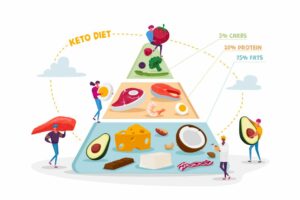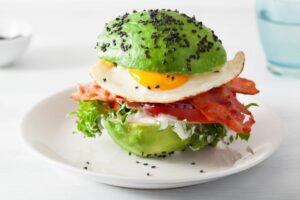TV Doctor Michael Mosley reveals why ketosis is the ultimate short-term weight loss tool
Ketosis is a guaranteed way to lose weight. But what is it? TV Doctor Michael Mosley reveals everything we need to know about ketosis and the Keto diet
Doctor Micheal Mosley is a well-known TV doctor, famous for his appearances on the BBC since 1985.
You may also know him as the man who popularised the famous 5:2 diet after appearing in the BBC documentary, Eat, Fast and Live Longer, where he discovered the powerful science behind the ancient idea of fasting.
The reason for the 5:2 diet’s popularity, was because it allowed people to still enjoy their food five times a week and only restrict their calories twice a week.
where he discovered the powerful science behind the ancient idea of fasting
When Dr Mosley tested out the fasting diet himself, he saw life-changing results. In fact, the Fast Diet (5:2 diet), has become one of the health phenomena of our times.
Doctor Mosley’s latest diet book is called, The Fast 800: How to combine rapid weight loss and intermittent fasting for long-term health.
Dr Mosley also provides a 12 week weight loss programme, available to purchase on the Fast 800 website, where he brings together the latest science that suggests how 800 calories is the magic number when it comes to successful dieting and maintaining weight-loss.
So how and why does this diet work so well? The answer is ketosis.

What is ketosis?
Put simply, ketosis is the process of the body burning fat for fuel.
The body normally runs on a combination of fat and sugar (glucose), so when you run down your sugar supplies through exercising, fasting or being on a low-carb diet, your body will start to burn your fat stores instead.
When your fuel source is switched from burning carbs to burning fat, this is what is known as ‘ketosis’.
This is also known as the metabolic switch – where your body switches from sugar-burning mode to fat-burning mode.
Think of it like driving a hybrid car – most of the time you run on electricity but as that begins to run down you switch over to burning petrol and then once topping up the battery again you switch back into electricity mode.
your body switches from sugar-burning mode to fat-burning mode
Experts think our bodies were designed to work in this way as a survival tactic when food was in short supply.
Historically we – and most animals – have had to exist in periods of feast or famine back when we didn’t have exposure to food 24/7 like we do now.
The brain had to learn to dig into our fat stores for energy, and cavemen would rely on this kind of energy to become mentally sharper during their fasted state so that they could find food and survive.

Keto Diet vs Ketosis
People often get confused between ketosis and being on a Keto diet.
The Keto diet is a very low-carb, high-fat diet that involves drastically reducing carbohydrate intake and replacing it with healthy fats such as avocado, cheese, lean meats and chocolate.
The reduced intake of carbs (less than 50g a day) puts the body into a metabolic state called ketosis hence the name Keto.
Going on a Keto diet will therefore induce ketosis, but being in a state of ketosis does not necessarily mean you’re on a keto diet.
Intermittent fasting and exercise can also increase the production of ketone bodies and put your body into a state of ketosis, forcing your body to burn fat from its fat reserves.

What foods does the keto diet consist of?
The keto diet is all about eating healthy fats, high protein, few carbohydrates and avoiding sugars.
You avoid carbs containing a lot of sugars and starches such as bread, pasta, rice and potatoes and some ketogenic diets limit or even cut out fruit due to its sugar content.
If you are going to eat fruit it needs to be a low carb option such as berries, including raspberries, blueberries, blackberries, strawberries.
On the keto diet, you restrict your carb intake to less than 50 grams a day
On a typical UK diet, the average person consumes around 350 grams of carbs each day, which is usually ample to fuel the body.
However, this means we never really tap into fat stores (which can be used as an efficient source of fuel for the body on low-carb and keto-friendly diets) and any excess is stored as body fat – leading to weight gain.
On the keto diet, you restrict your carb intake to less than 50 grams a day, your body eventually runs out of fuel and after three or four days it starts to break down fat for energy instead, which leads to weight loss.

Ketosis and weight loss
The ketogenic diet may be a good option if you’re looking to shed extra pounds or boost fat-burning, especially if you’ve found that other diets and weight loss plans haven’t worked for you in the past.
Because it’s designed to be followed short-term, it can also be a good way to help foster healthy eating habits long-term by emphasizing the importance of healthy fats, high-quality proteins and fibre-rich foods as part of a nutritious, well-rounded diet.
it can also be a good way to help foster healthy eating habits
Plus, as fats and proteins are digested slowly, it can alleviate the feelings of hunger associated with other diets.
The rapid weight loss phase The Very Fast 800 involves eating 800 calories a day, for twelve weeks. The key to feeling satiated, while restricting calories, is to consume a moderately low-carb Mediterranean-style diet, rich in protein, fibre and healthy fats.
It’s an easy to follow diet that can lead to real weight loss.

What are the other benefits of a Keto Diet?
Originally developed to treat epilepsy in the 1920s, researchers have now unearthed a long list of health benefits associated with the keto diet, such as faster weight loss, improved blood sugar control and lower cholesterol levels.
Research suggests that Keto offers neuroprotective benefits that may help treat or prevent conditions like Parkinson’s and Alzheimer’s.
One study found that children following a ketogenic diet had improved alertness and cognitive functioning.
esearchers have now unearthed a long list of health benefits associated with the keto diet
Ketosis is also a word you’ll probably see when searching for information on diabetes.
Halle Berry, 55 swears by the ketogenic diet. According to the Diet Doctor, Berry uses the keto diet, ‘as a means to stay in top shape and keep her type 1 diabetes in check’.
Berry cuts out many high calorie foods such as bread, cakes and biscuits, and according to Women’s Health Magazine, she fills her diet with healthy fats such as avocado, coconut oil, and butter.
More Healthista Content:
3 healthy breakfast recipes that will keep you full till lunch
Can’t sleep? These 20 healthy foods could be the cure
Brittle nails? Feeling bloated? 7 signs you’re not digesting protein properly
7 ways to naturally manage winter aches and pains – an Osteopath’s guide
How to eat, exercise and live in sync with your menstrual cycle
